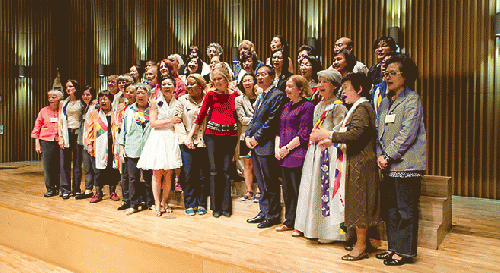In fact, all United Nations Commissions of Inquiry (COI) since the 2006 establishment of the Human Rights Council have been related to armed conflict. The foreword of Amnesty International's latest State of the World's Human Rights makes this link crystal clear.
The 2013 the DPRK COI found "reasonable grounds" to believe crimes against humanity may have taken place regarding (1) starvation, (2) enforced disappearances, and (3) DPRK detention centers.
(1) The COI acknowledges the national security logic behind DPRK understatements of the severity of the mid-late 1990s famine and their reluctance to allow food aid monitoring. America almost bombed the country over its nuclear program in 1994.
(2) The COI provides lengthy descriptions of dozens of "abductions" of Japanese nationals between 1977-83. These violations took place in a postcolonial Cold War context where the former colonizer does not recognize the sovereignty of its former colony. Andrei Lankov has noted how the five "abductees" returned to Japan in 2002 bore one similarity: they had never trained DPRK intelligence agents. The return of the others would risk "complete disintegration of their clandestine networks" in Japan.
(3) The COI heard testimony of arbitrary imprisonment and some horrific violence in political prisons, including torture. These are extralegal spaces of exception where people are stripped of political rights and become what philosopher Giorgio Agamben calls "bare life." They typically originate in armed conflict and are justified by national security, incarcerating either adversaries and scapegoats or unwanted refugees fleeing violence.
The fact that DPRK officials will not risk rebellion is given as evidence that the DPRK is incapable of reform. Yet Urquhart does not take the next step of acknowledging that the intolerance towards dissent is largely a function of a threatening geopolitical context. Virtually since its inception, the DPRK has existed in a context where any organized rebellion is likely to receive foreign support and lead to pressure for an American and South Korean military intervention. Dissent is thus quashed immediately and political prisons serve as a threat against agitation. Releasing these prisoners risks giving those with the most reason to hate the Kim government an opportunity to mobilize against it.
In short, there is more historical and comparative precedent for believing the worst DPRK human rights violations are closely related to the state of war than the reverse. Permanent resolution of these issues is more effectively encouraged through political normalization than maintaining the status quo with additional sanctions and the threat of humanitarian intervention.
Ahn is accused of "deliberately misrepresenting sanctions" as harmful to civilians by obscuring how they are "targeted" against the elite. This is a common misperception that results from focusing exclusively on the formal justifications for sanctions resolutions instead of their overall consequences.
Many prohibited dual-use materials, like aluminum alloy and sodium cyanide, are crucial to developing economies. The U.S. list of banned "luxury" items includes DVD players, sporting goods, art, laptops and most motor vehicles. U.S. Treasury "actions" since 2005 severely hampered DPRK access to the global financial system. The DPRK does not qualify for most forms of Western developmental assistance and loans. The World Food Programme DPRK mission is perpetually underfunded and most international investment is deterred.
Economic isolation exacerbates hunger and justifies militarism. It also strangles economic development, which goes hand-in-hand with human rights. The belief that sanctions and isolation are more effective at promoting human rights than peace and engagement is, as Christine Ahn rightly noted, a "fringe" position in the greater human rights field.
The DPRK bears responsibility for severe human rights violations. But the inaccessibility of the DPRK should not blind us to the predictable outcomes of a 65-year asymmetrical threat, including inaccessibility. Would it be reasonable to argue the threat of Palestinian militants to Israelis is irrelevant to Israeli human rights violations? Why must we assume the DPRK is an exception where the national security threat is irrelevant to the human rights violations of what is obviously a national security state?
A MANICHEAN WORLDVIEW
Critics of WC appear to be arguing that the severity of DPRK violations constitute an exception like the Third Reich or Khmer Rouge. Urquhart sees Kim Jong Un as among "genocidal dictators" who "rule vast populations of slaves, unopposed." Both Foreign Policy articles attribute a Nazi analogy to the United Nations. Such analogies render peace superfluous and force the only ethical approach. It is impossible to justify engagement if the only thing Westerners associate North Koreans with is unverifiable defector reports of horrifying violence.
Urquhart makes the strikingly hypocritical accusation that WC is espousing a "Manichean" worldview. He identifies two camps: "free speech, democracy, economic freedom and the freedom of travel" versus "dictatorship, totalitarian censorship, the leadership cult and prison camps." Anyone who does not recognize this line in the sand is clearly anti-American and pro-tyranny. Kim, Saddam and Gadhafi are simply evil incarnate, and Nobel Laureate Mairead Maguire is a "moral cretin" for rejecting this brand of villainization. If this is not a Manichean worldview, what is?
The WC position is the polar opposite of Manichean. It is explicitly designed to circumvent the "us versus them" logic of war where anyone who takes a nuanced stance is not to be trusted. Christine Ahn told CNN how this "Cold War, McCarthyist mentality" helps maintain the division: "I am pro-peace. I am pro-engagement. I am pro-dialogue. I am pro-human rights."

The WomenCrossDMZ International Peace Symposium that followed WomenCross' march from North to South Korea.
(Image by photo: Leo Byrne) Details DMCA
(Note: You can view every article as one long page if you sign up as an Advocate Member, or higher).





